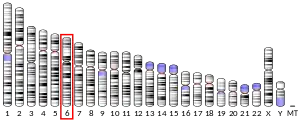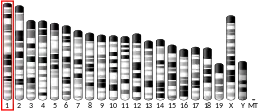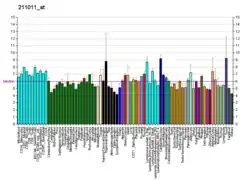Collagen, type XIX, alpha 1
Collagen alpha-1(XIX) chain is a protein that in humans is encoded by the COL19A1 gene.[5][6][7]
| COL19A1 | |||||||||||||||||||||||||||||||||||||||||||||||||||
|---|---|---|---|---|---|---|---|---|---|---|---|---|---|---|---|---|---|---|---|---|---|---|---|---|---|---|---|---|---|---|---|---|---|---|---|---|---|---|---|---|---|---|---|---|---|---|---|---|---|---|---|
| Identifiers | |||||||||||||||||||||||||||||||||||||||||||||||||||
| Aliases | COL19A1, COL9A1L, D6S228E, collagen type XIX alpha 1, collagen type XIX alpha 1 chain | ||||||||||||||||||||||||||||||||||||||||||||||||||
| External IDs | OMIM: 120165 MGI: 1095415 HomoloGene: 55608 GeneCards: COL19A1 | ||||||||||||||||||||||||||||||||||||||||||||||||||
| |||||||||||||||||||||||||||||||||||||||||||||||||||
| |||||||||||||||||||||||||||||||||||||||||||||||||||
| |||||||||||||||||||||||||||||||||||||||||||||||||||
| |||||||||||||||||||||||||||||||||||||||||||||||||||
| |||||||||||||||||||||||||||||||||||||||||||||||||||
| Wikidata | |||||||||||||||||||||||||||||||||||||||||||||||||||
| |||||||||||||||||||||||||||||||||||||||||||||||||||
This gene encodes the alpha chain of type XIX collagen, a member of the FACIT collagen family (fibril-associated collagens with interrupted helices). Although the function of this collagen is not known, other members of this collagen family are found in association with fibril-forming collagens such as type I and II, and serve to maintain the integrity of the extracellular matrix. The transcript produced from this gene has an unusually large 3' UTR which has not been completely sequenced.[7]
References
- GRCh38: Ensembl release 89: ENSG00000082293 - Ensembl, May 2017
- GRCm38: Ensembl release 89: ENSMUSG00000026141 - Ensembl, May 2017
- "Human PubMed Reference:". National Center for Biotechnology Information, U.S. National Library of Medicine.
- "Mouse PubMed Reference:". National Center for Biotechnology Information, U.S. National Library of Medicine.
- Myers JC, Sun MJ, D'Ippolito JA, Jabs EW, Neilson EG, Dion AS (Mar 1993). "Human cDNA clones transcribed from an unusually high-molecular-weight RNA encode a new collagen chain". Gene. 123 (2): 211–7. doi:10.1016/0378-1119(93)90126-N. PMID 7916703.
- Gerecke DR, Olson PF, Koch M, Knoll JH, Taylor R, Hudson DL, Champliaud MF, Olsen BR, Burgeson RE (Jul 1997). "Complete primary structure of two splice variants of collagen XII, and assignment of alpha 1(XII) collagen (COL12A1), alpha 1(IX) collagen (COL9A1), and alpha 1(XIX) collagen (COL19A1) to human chromosome 6q12-q13". Genomics. 41 (2): 236–42. doi:10.1006/geno.1997.4638. PMID 9143499.
- "Entrez Gene: COL19A1 collagen, type XIX, alpha 1".
Further reading
- Yoshioka H, Zhang H, Ramirez F, et al. (1992). "Synteny between the loci for a novel FACIT-like collagen locus (D6S228E) and alpha 1 (IX) collagen (COL9A1) on 6q12-q14 in humans". Genomics. 13 (3): 884–6. doi:10.1016/0888-7543(92)90176-S. PMID 1639419.
- Inoguchi K, Yoshioka H, Khaleduzzaman M, Ninomiya Y (1995). "The mRNA for alpha 1(XIX) collagen chain, a new member of FACITs, contains a long unusual 3' untranslated region and displays many unique splicing variants". J. Biochem. 117 (1): 137–46. doi:10.1093/oxfordjournals.jbchem.a124700. PMID 7775380.
- Myers JC, Yang H, D'Ippolito JA, et al. (1994). "The triple-helical region of human type XIX collagen consists of multiple collagenous subdomains and exhibits limited sequence homology to alpha 1(XVI)". J. Biol. Chem. 269 (28): 18549–57. doi:10.1016/S0021-9258(17)32344-X. PMID 8034603.
- Bonaldo MF, Lennon G, Soares MB (1997). "Normalization and subtraction: two approaches to facilitate gene discovery". Genome Res. 6 (9): 791–806. doi:10.1101/gr.6.9.791. PMID 8889548.
- Sumiyoshi H, Inoguchi K, Khaleduzzaman M, et al. (1997). "Ubiquitous expression of the alpha1(XIX) collagen gene (Col19a1) during mouse embryogenesis becomes restricted to a few tissues in the adult organism". J. Biol. Chem. 272 (27): 17104–11. doi:10.1074/jbc.272.27.17104. PMID 9202028.
- Khaleduzzaman M, Sumiyoshi H, Ueki Y, et al. (1998). "Structure of the human type XIX collagen (COL19A1) gene, which suggests it has arisen from an ancestor gene of the FACIT family". Genomics. 45 (2): 304–12. doi:10.1006/geno.1997.4921. PMID 9344653.
- Strausberg RL, Feingold EA, Grouse LH, et al. (2003). "Generation and initial analysis of more than 15,000 full-length human and mouse cDNA sequences". Proc. Natl. Acad. Sci. U.S.A. 99 (26): 16899–903. Bibcode:2002PNAS...9916899M. doi:10.1073/pnas.242603899. PMC 139241. PMID 12477932.
- Myers JC, Li D, Amenta PS, et al. (2003). "Type XIX collagen purified from human umbilical cord is characterized by multiple sharp kinks delineating collagenous subdomains and by intermolecular aggregates via globular, disulfide-linked, and heparin-binding amino termini". J. Biol. Chem. 278 (34): 32047–57. doi:10.1074/jbc.M304629200. PMID 12788917.
- Mungall AJ, Palmer SA, Sims SK, et al. (2003). "The DNA sequence and analysis of human chromosome 6". Nature. 425 (6960): 805–11. Bibcode:2003Natur.425..805M. doi:10.1038/nature02055. PMID 14574404.
- Käpylä J, Jäälinoja J, Tulla M, et al. (2005). "The fibril-associated collagen IX provides a novel mechanism for cell adhesion to cartilaginous matrix". J. Biol. Chem. 279 (49): 51677–87. doi:10.1074/jbc.M409412200. PMID 15383545.
- Gerhard DS, Wagner L, Feingold EA, et al. (2004). "The status, quality, and expansion of the NIH full-length cDNA project: the Mammalian Gene Collection (MGC)". Genome Res. 14 (10B): 2121–7. doi:10.1101/gr.2596504. PMC 528928. PMID 15489334.
This article is issued from Wikipedia. The text is licensed under Creative Commons - Attribution - Sharealike. Additional terms may apply for the media files.




